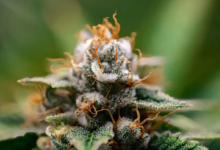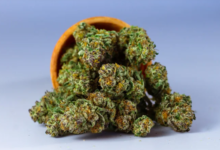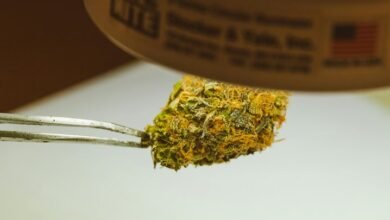What Is Difference Between Cbd and Thc

Cannabidiol (CBD) and tetrahydrocannabinol (THC) are prominent cannabinoids sourced from cannabis, but they exhibit significant differences. Their unique chemical structures influence their interaction with cannabinoid receptors. While THC is recognized for its psychoactive properties, CBD is non-psychoactive and is often associated with therapeutic benefits. Understanding these distinctions is crucial for those exploring their potential uses in health and wellness. What implications do these differences hold for users and the broader medical community?
Chemical Structure and Properties
The chemical structures of cannabidiol (CBD) and tetrahydrocannabinol (THC) exhibit key differences that influence their respective effects on the human body.
CBD features a different arrangement of chemical bonding, resulting in distinct molecular interactions compared to THC.
These structural variations affect how each compound interacts with cannabinoid receptors, thereby shaping their therapeutic potentials and contributing to the ongoing discourse on personal autonomy in health choices.
Psychoactive Effects
Psychoactive effects represent a critical distinction between CBD and THC, primarily stemming from their interaction with the endocannabinoid system.
THC induces notable psychoactive effects, influencing mood and perception, which can impact mental health positively or negatively.
Conversely, CBD lacks these psychoactive properties, promoting a sense of calm without alteration of consciousness, making it a favorable option for those seeking mental health support without intoxication.
Therapeutic Uses
Therapeutic uses of CBD and THC have garnered significant attention in both clinical and anecdotal contexts, reflecting their respective roles in healthcare.
CBD is frequently studied for pain relief and anxiety management without psychoactive effects, while THC provides effective pain relief but can induce psychoactivity.
Both compounds offer unique benefits, appealing to those seeking alternative treatments for chronic pain and mental health conditions.
Legal Status and Regulation
Legal complexities surrounding CBD and THC have evolved significantly in recent years, reflecting a broader societal shift towards the acceptance of cannabis-derived products.
The regulatory framework governing these substances varies widely, leading to complex legal implications. As jurisdictions adapt to changing perceptions, individuals and businesses must navigate this intricate landscape to ensure compliance while exercising their rights to access and utilize these compounds.
Conclusion
In the intricate landscape of cannabis compounds, CBD and THC stand as distinct pillars, each offering unique benefits and challenges. While THC evokes a euphoric experience, CBD serves as a beacon of calm and healing. Their divergent paths in therapeutic applications underscore the necessity of informed choices in health management. Ultimately, understanding these compounds is not merely an academic exercise; it is a pivotal step towards unlocking the potential of cannabis in modern medicine, where knowledge fosters empowerment.






